The simple analogy to understanding the value of an AC compressor in any HVAC system is comparing it to a human heart or a CPU in a computer. Without it, the entire system will cease to operate immediately.
An AC compressor replacement will cost you more than a third of the overall HVAC replacement cost, which begs the question, what's the actual price of an AC compressor?
Replacing an AC compressor for an average home costs $1,200. The typical range is between $800 and $2,800, where parts and labor make about 50% each. That means parts alone will cost you between $400 and $1,600 and labor $400 to $1,200.
However, the topic on AC compressor cost is broader than that. The article will detail all you need to know about compressor prices and other related installation charges involved.
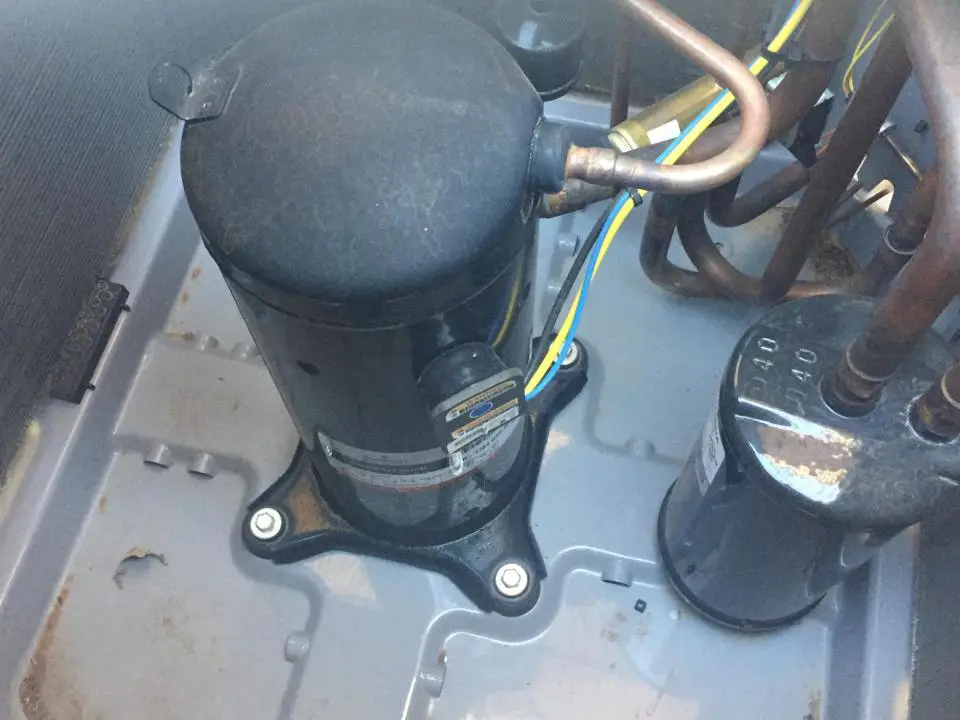
Photo credit: foxongreen.com
Air Conditioner Compressor Terminology and Common Concepts
Understanding the cost of an AC compressor is a more in-depth discussion that requires you to grasp a few terms and concepts involved. Here are common words used when talking about the prices of AC compressors.
- Condensing Unit: The outdoor unit housing the compressor
- Refrigerant: A highly toxic and flammable fluid that transforms from liquid to gas and vice versa to aid air conditioning as appropriate.
- Evaporator Unit: Located near the indoor air handler absorbs hot air from the room and transfers it to the condenser coil for conditioning before receiving it back as cold air.
- BTU: Short for British Thermal Unit, BTU measures the energy required for increasing water temperature by 1°F. BTUs measure the amount of heat removed in your home instead of heat added. So, a high BTU rating means more power.
- Condenser Unit: This is an outdoor component of the heat pump that receives refrigerant in its gaseous form and changes it to liquid before blowing it away into the environment.
What is an Air Conditioner Compressor?
An AC compressor is an outdoor component of an HVAC system responsible for increasing the temperature and pressure of the vapor refrigerant in the AC system.
The compressor is located in the condenser unit and aids heat exchange in the coils to complete the air conditioning process.




Photo credit: sidzcoolcare.com
How Much Does an Air Conditioner Compressor Cost?
A well-maintained compressor will serve you for a solid 10 to 15 years. However, along the way, just like any other machine, the compressor may develop problems that will require either repairs or replacement of the entire unit or just a part.
Depending on the nature of the compressor problem, a technician should advise you whether to replace the entire AC system or just the compressor.
The cost of the compressor alone is between $400 to $1,600, whereas labor will cost you between $400 to $1,200. As much as the parts cost more, installation charges are also in a close range of about 50/50.
Most contractors will bill you between $50 to $150 or more depending on other factors such as the cost of living and season.
While the average cost of a home AC compressor is about $1,200, replacing the AC plus labor costs between $800 and $2,800.
The national average for replacing an AC is $1,200, while the lowest you should expect to pay for an AC compressor is $800. You'll pay up to $2,800 on the higher end.
Note: To cut costs, technicians recommend replacing the whole AC unit if the compressor lacks a warranty; otherwise, a compressor under warranty will cost you half the total amount to replace.




Photo credit: theritualforum.com
Air Conditioner Compressor Cost By Types
Air conditioners are available in various types and come in three main variations, variable speed, two-stage, and single-stage.
- Variable Speed: Adjusts automatically for precise temperature delivery and maximized energy efficiency. Variable speed compressors are both expensive to repair and install, but will work at any capacity, are cost-friendly to run, and are the best dehumidifiers.
- Two-Stage: Adjustable at two speeds where full capacity is on the higher setting, and the low stage is between 60 and 70% capacity.
Two-stage compressors distribute more even temperatures and run quietly. Such compressors are also good dehumidifiers but more expensive to install and repair `. - Single-Stage: Operates at one speed running at full capacity until the adequate indoor temperature is achieved. Single-stage are less efficient, cheap to install, and with on and off cycles making it short-lived.
Types of AC Compressors
- Scroll
Scroll compressors are highly efficient and reliable, making them a favorite to many homeowners today.
These compressors have a fixed center coil known as a scroll. In addition, there is a secondary scroll rotating around the first, pushing the refrigerant to the center and compressing it.
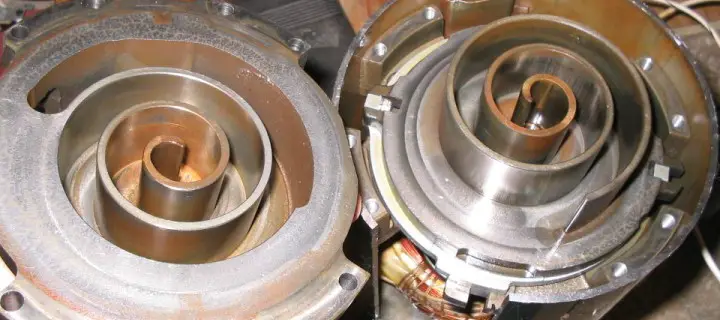



Photo credit: homeairconditioner.ca
- Reciprocating
Reciprocating compressors are more efficient and common among most homeowners. The compressor comprises pistons moving up and down within the cylinder to create a vacuum effect drawing in the refrigerant and then compressing it to vapor. - Centrifugal
Centrifugal AC compressors use centrifugal force for drawing in the refrigerant and spinning it fast to compress it. Such compressors are mostly a reserve for larger commercial AC systems. - Rotary
These compressors have blade-like shafts rotating within the cylinder. The shaft pulls in the refrigerant and then compresses it into vapor. Such compressors are compact and operate quietly, making them suitable in noise-sensitive environments such as hospitals. - Screw
Screw compressors are reliable and efficient units mostly used in commercial setups where larger HVAC systems are essential. The compressor moves the refrigerant from the wider side to the narrow end using two big spiral rotors.
As space narrows down, the mechanism compresses the refrigerant into vapor.
Screws are efficient compressors suitable for use in commercial buildings and other industrial setups.
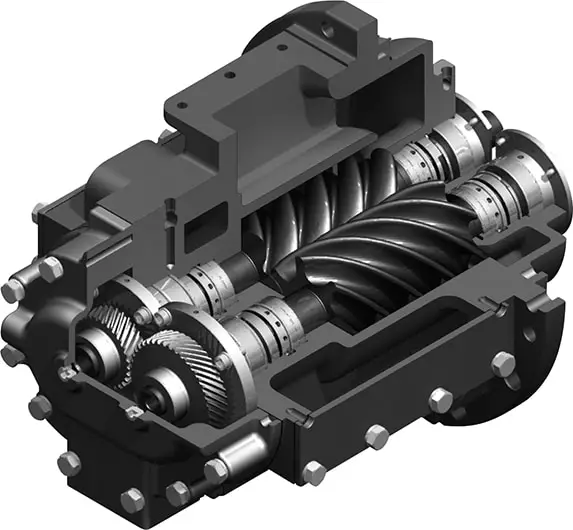



Photo credit: airbestpractices.com
Here are prices of AC compressors by type; installation charges inclusive.
- Minisplit: $1,000-$2,500
- Central: $1,000-$2,500
- Window Unit: $150-$700
Air Conditioner Compressor Cost By Size
So, how do you know the size of a compressor before deciding on replacement cost? Compressor size is measured in tons according to how powerful it is. Most compressors fall in the range of 1.5 to 6 tons.
Below is an exhaustive breakdown of prices according to tons or size
- 1.5 to 2 Tons: $1,000 to $1,250
- 2.5 Tons: $1,100 to $1,600
- 3 Tons: $1,200 to $1,750
- 3.5 Tons: $1,250 to $1,900
- 4 Tons: $1,350 to $2,100
- 5 Tons: $1,450 to $2,300
- 6 Tons: $1,650 to $3,000
Note: one ton is equivalent to +/- 12,000 BTUs. The compressor price depends on the amount of heat the BTU will remove per hour.
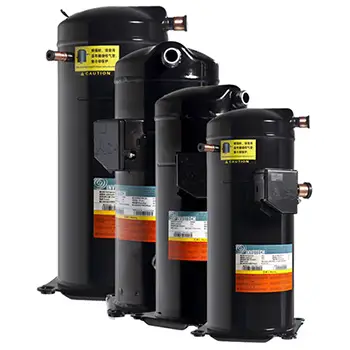



Photo credit: pickhvac.com
Home Air Conditioner Compressor Cost By Brand
An AC compressor will cost more or less, depending on the brand. Pairing replacement parts with the same compressor brand is also an effective way to iron out any compatibility issues. However, some compressors will work fine with parts from partner brands.
Here are some top compressor brands and their costs.
- Lennox: $600-$2,300
- Copeland: $600-$2,300
- Carrier: $450-$2,000
- American Standard/Trane/Mitsubishi: $4,50-$2,200
- York/Coleman: $550-$1,500
- Rheem/Ruud: $600-$1,400
- Goodman/Amana: $350-$1,200
AC Compressor Repair Cost
Although replacing the compressor or the entire AC is always the best option, some compressor parts may only require quick fixing. Below are common parts and their repair charges that a technician will easily fix.
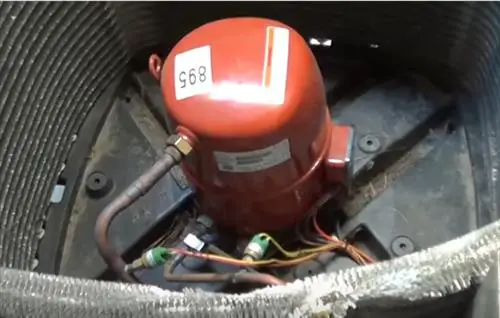



Photo credit: hvachowto.com
- Refrigerant Lines: $200 to $650
- Refrigerant Leak Detection & Repair: Depending on the refrigerant type, AC unit's age, and leakage severity, it will cost you $300 to $1,500 to inspect and diagnose the leakage.
- Hard Start Kit: The unit costs between $100 and $270, inclusive of installation charges.
- Replacing Contactor: $20 to $100
- R410a Refrigerant Refill: $100 to $200
- R22 Refrigerant Refill: $200 to $600
- Start Capacitors: $30 to $80
AC Compressor Cost Factors
The cost of replacing an AC compressor depends on several factors, including the brand and type of the compressor, unit size measured in tons, type of refrigerant, and the warranty cover.
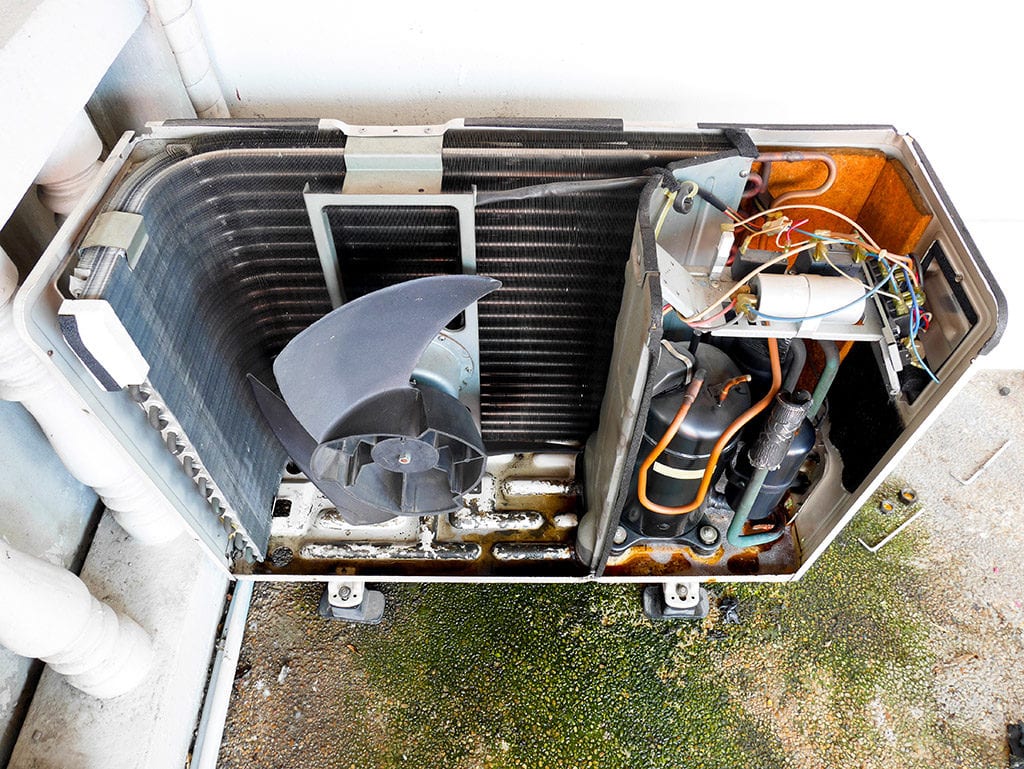



Photo credit: onehourairftworth.com
Brand
The prices of air conditioner compressors vary sharply across brands. Most AC systems work well with the manufacturers' compressor brand or OEM compressor of a similar type.
When replacing a compressor alone, consider finding the same brand as the AC system to avoid miscommunication between the evaporating unit and the indoor air handler from a different brand.
Type
AC compressors come in three models, Variable speed, two-stage, and single stage. Variable speed and two-stage models are more efficient but expensive than single-stage.
Size
The size of a compressor is measured in tons. Typically 1ton is equivalent to 12,000 BTUs. Larger units with up to five tons will cost you between $1,650 and $2,750.
Refrigerant
After replacing the compressor, next is filling the refrigerant. Depending on the freon type, either an R22 or R410a, you'll spend between $100 and $600. Again, your technician should guide you if the system requires just a top-up.
Season
HVAC contractors will charge high during summer and winter when they are busy. To save on replacement costs, you may consider their services in off-peak seasons when they offer you discounts and other incentives.
Cost of Living
You’ll pay a little more or less depending on the cost of living in your area. While technicians will charge between $50 and $100 to replace a compressor which takes about four to six hours, you might pay up to $150 per hour in some areas.
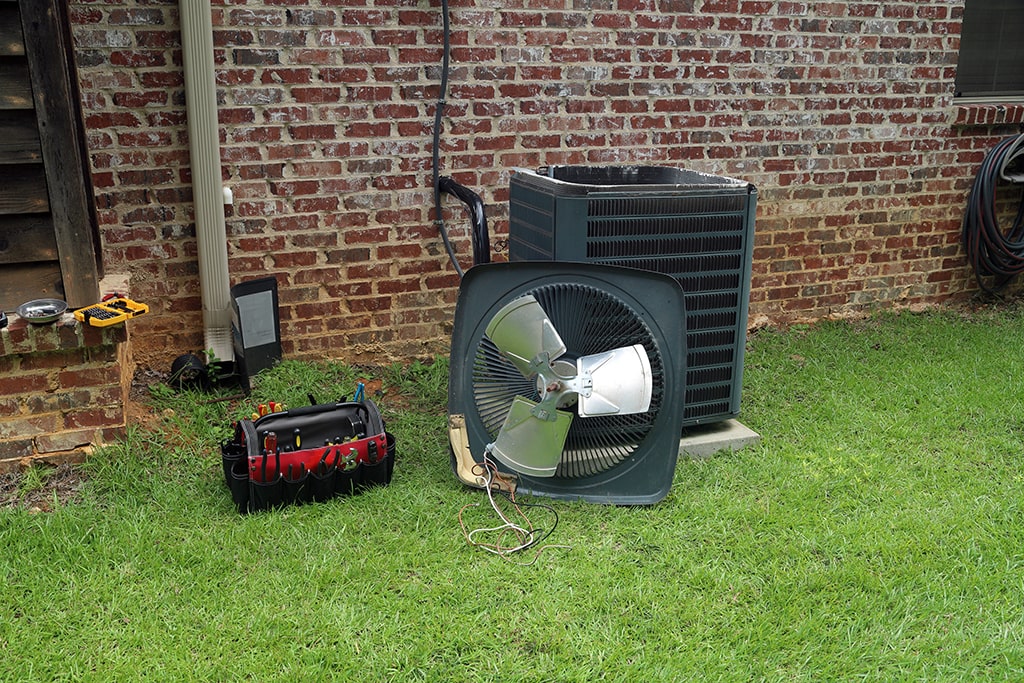



Photo credit: metropha.com
Warranty Coverage
Free replacement for compressors with a valid warranty. It will cost less to replace the whole AC unit if the security cover is expired.
Compressor Replacement Comparisons
After establishing that your compressor is faulty, you might think of repairing or replacing the whole AC, either by yourself or by engaging a professional HVAC technician.
Let's see how each action compares to the other.
DIY vs Professional HVAC Technician
Many people prefer DIY projects as a way of saving on costs, time, and unnecessary frustration. But, unfortunately, replacing or repairing your AC compressor might not be for you unless you have some knowledge of an HVAC system.
You must have a proper understanding of handling refrigerant and high voltages, otherwise, do not risk your life if you can engage an HVAC pro. Improper diagnosis will easily lead to electrocution, cuts, and other severe injuries. You also risk damaging the unit further.
The refrigerant is subject to a lot of pressure that may easily bar you from replacing the line filter or sealing the compressor valve core.
Even the low-pressure paths will be unmanageable without specialized tools that are EPA-certified. State laws also require that you have a license to purchase a refrigerant.
However, you may carry out basic maintenance such as replacing a line filter or performing regular cleaning; otherwise, if the compressor is still under warranty, you should launch a claim or engage a technician for between $50 to $150 per hour.
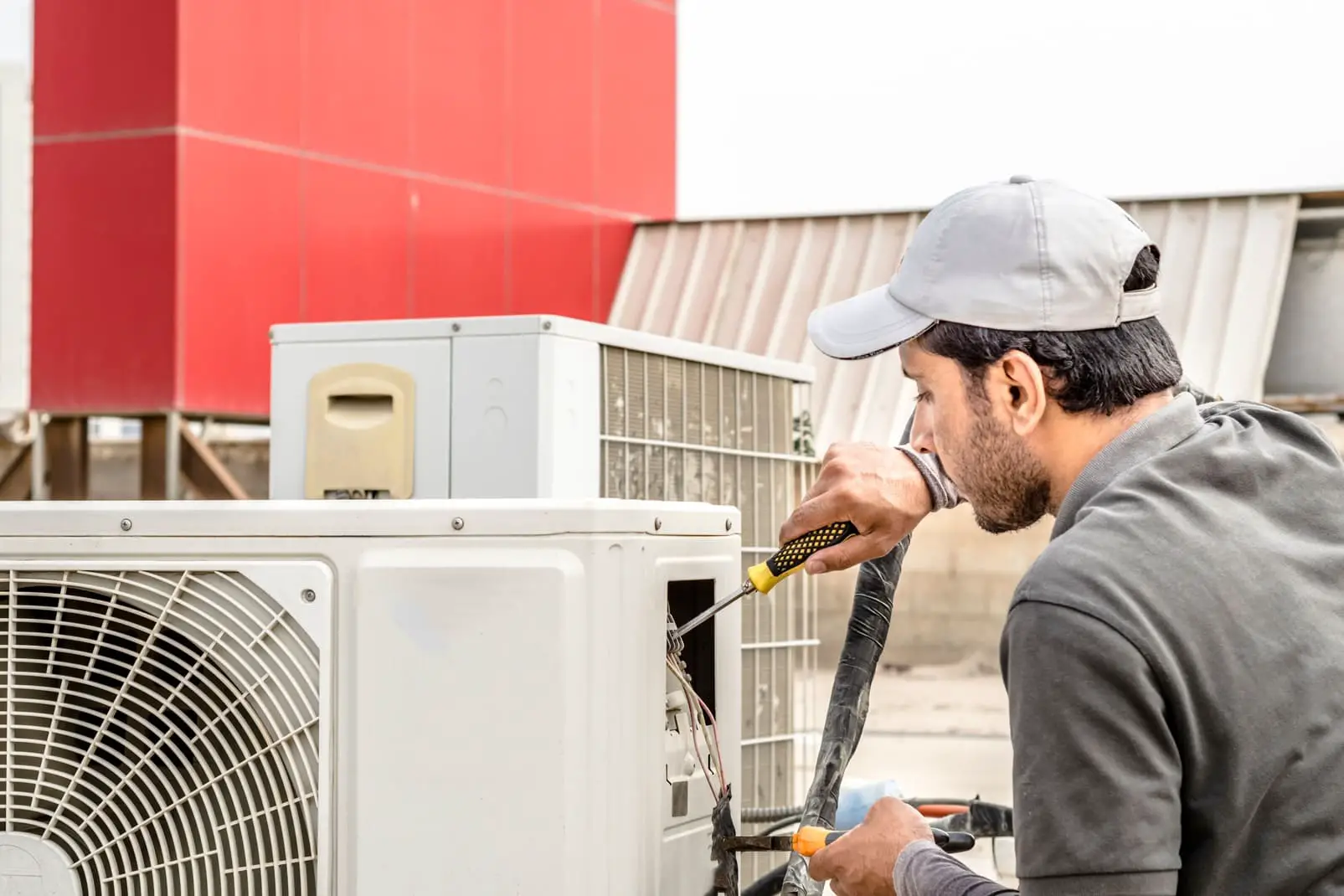



Photo credit: extraairandheat.com
AC Repair vs Replacement
An AC compressor is the most expensive part of an HVAC system that replacing can be more costly than acquiring a whole new AC unit. Repairing the compressor is yet another costly task that will cost you almost half the unit price.
So, unless your unit is still under warranty, HVAC technicians advise replacing the whole AC unit.
However, before replacing the entire AC unit or compressor, get a qualified technician to examine it for other problems. Some issues can be fixed by repairing.
When to Replace Your AC Compressor
So, how do you know if a compressor has completed its lifecycle and is due for a replacement? First, you’ll need to look out for signs, such as a tripping circuit breaker, strange noises, abnormal vibration, immovable clutch, and system dissipating warm air.
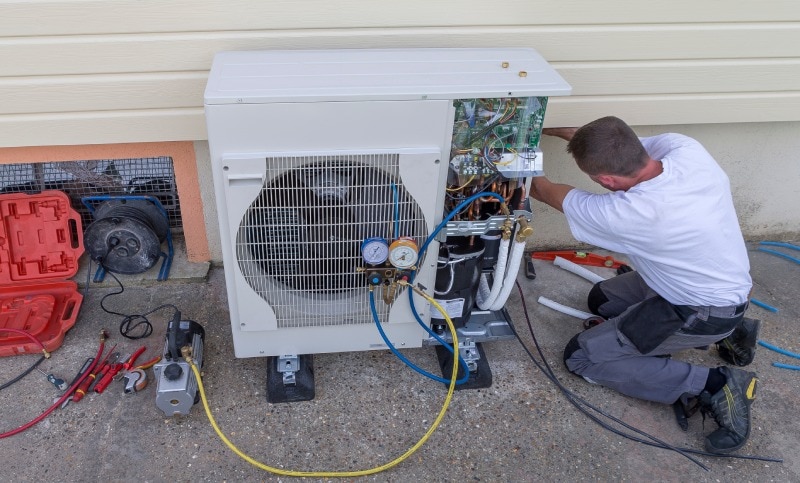



Photo credit: learnmetrics.com
Below we explore signs of a bad compressor in detail.
Signs of a Bad AC Compressor
System Dissipating Warm Air
An AC that starts normally but blows warm air or air coming out of the vents is less cold than it should be, then your AC compressor might be faulty. It could also be a sign of improper airflow.
Consider cleaning the condenser coil and changing the air filter before you diagnose the compressor. Insufficient or too much refrigerant in the AC system could also cause warm air emissions instead of cold.
Circuit Breaker Keeps Tripping
A tripping circuit breaker each time a compressor starts could mean electrical overdraw. If it keeps happening, that should be a sign of a failing compressor.
Insufficient refrigerant or an overheating unit could also cause a circuit breaker to trip, which in turn causes the compressor to heat up.
Immovable Compressor Clutch
A clutch that doesn't engage will cause your automotive AC to stop working. It could be a sign that your compressor is on its way out. It could also be a problem with the electrical connection or worn-out bearings in your AC clutch plate.
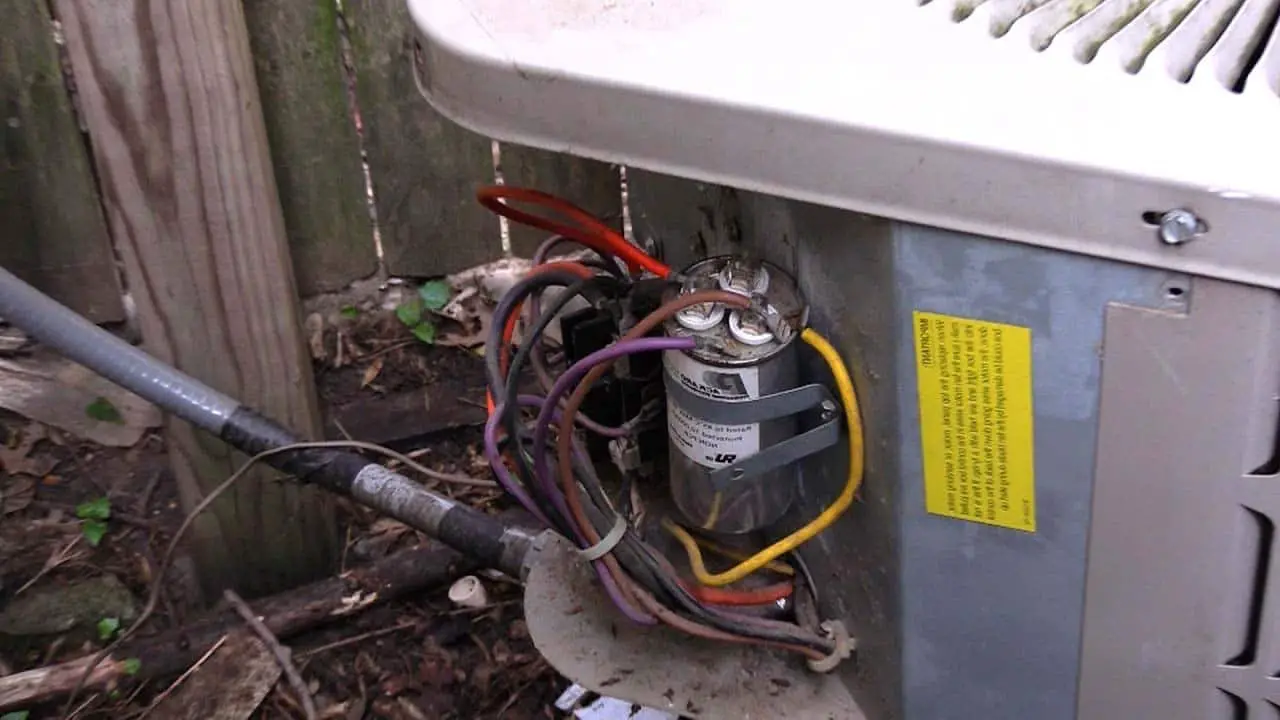



Photo credit: alltimeairconditioning.com
Outside Unit Vibrates When Ignited
Watch out for a failing compressor if the condenser unit shakes anytime the system starts. But first, you may need to check out for any rusting or loose bolts mounting the compressor. Then, if the rubber feet are firm but the shaking continues, it's time to replace your compressor.
Strange Noises
Any noise you hear from the condensing unit should come from the fan motor or condenser fan. Any sudden noise from the compressor or the condensing unit producing strange loud noises could signal an internally worn-out compressor.
Conclusion
A compressor is an expensive part of an AC system that requires proper maintenance and regular servicing to serve you long. Otherwise, you may need to incur replacement costs in case of a breakdown since repairs are never an ideal option.
However, make sure your AC system has a warranty so that in case the compressor fails within the guarantee period, you may save on charges of installation, which are equally high.
People Also Ask
Determining when to replace an AC compressor and how much it would cost to get a whole new AC system is confusing across many homeowners. Below are some common questions about AC compressors.
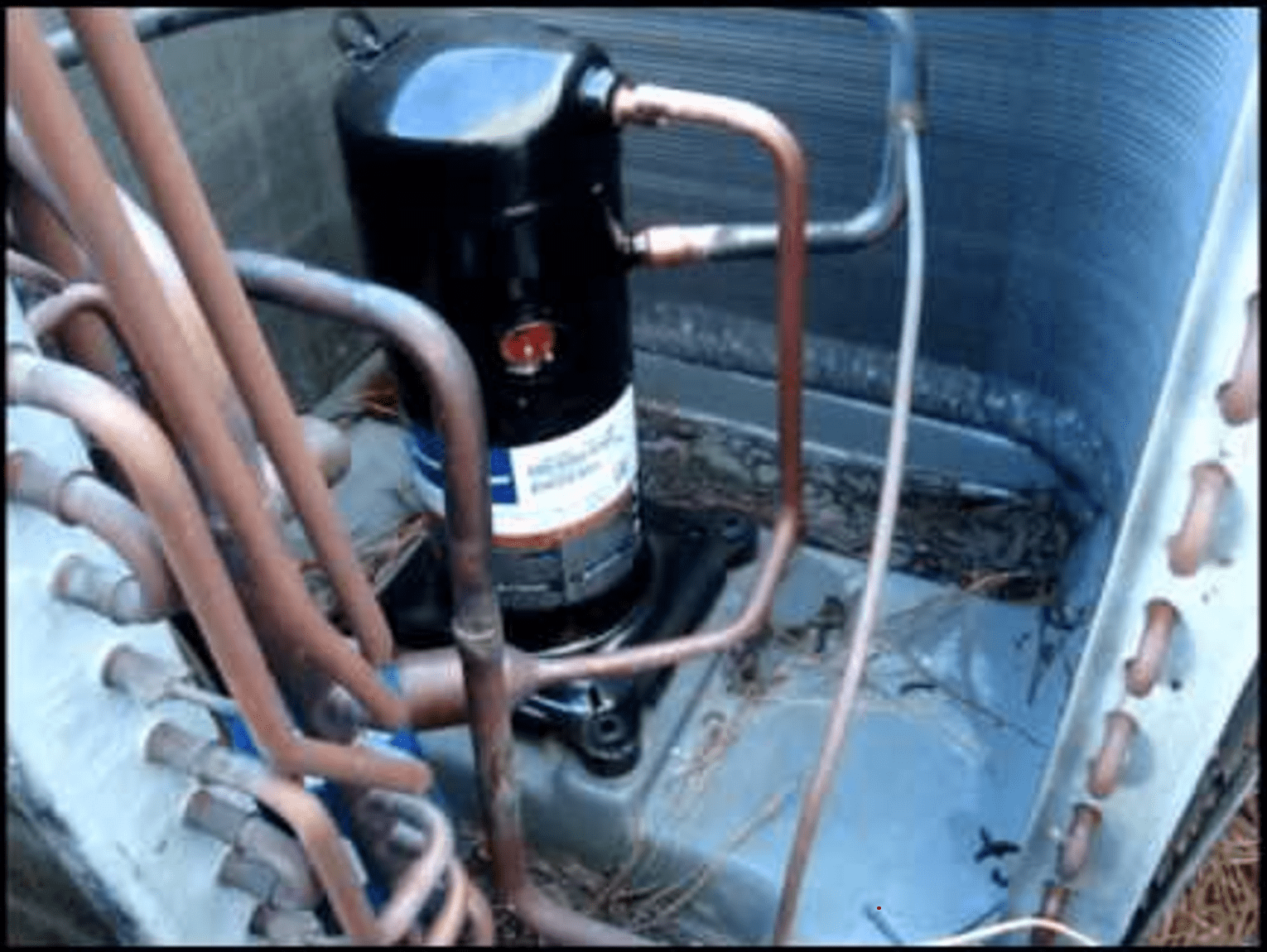



Photo credit: hvacbrain.com
How Long Do Air Conditioner Compressors Last?
Air conditioner compressors cost more for good reasons. One of them is the long service life when properly maintained.
While the whole HVAC system will serve you for a whopping 15 to 20 years, with good maintenance that includes regular servicing, an AC compressor will last between 10 and 15.
Is Replacing an AC Compressor Difficult?
Replacing an AC compressor is nothing more than changing the alternator. What makes a compressor a Non-DIY project is a refrigerant, which requires specialized tools to replace. Do not attempt to replace a compressor if you lack knowledge of HVAC systems.
Is it Worth Replacing the Compressor on an AC Unit?
Compressors are costly to replace. However, some problems are repairable, while others may require replacing either the compressor or the whole AC unit.
After a thorough examination by a qualified technician, you may have the compressor replaced if it's still under warranty. Otherwise, replacing the whole AC is a cost-effective option if the warranty is expired.
